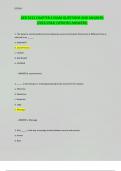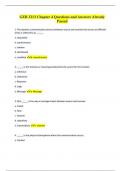Geb 3213 chapter 4 Study guides, Class notes & Summaries
Looking for the best study guides, study notes and summaries about Geb 3213 chapter 4? On this page you'll find 84 study documents about Geb 3213 chapter 4.
All 84 results
Sort by
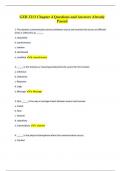
-
GEB 3213 Chapter 4 Questions and Answers Already Passed
- Exam (elaborations) • 8 pages • 2024
- Available in package deal
-
- $8.99
- + learn more
GEB 3213 Chapter 4 Questions and Answers Already Passed 1. The dynamic communication process between source and receiver that occurs at different times is referred to as _____. a. sequential b. asynchronous c. random d. distributed e. stratified b. asynchronous 2. _____ is the stimulus or meaning produced by the source for the receiver. a. Inference b. Deduction c. Response d. Logic e. Message e. Message 3. A(n) _____ is the way a message travels between source and receiver. a. t...
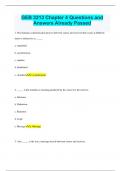
-
GEB 3213 Chapter 4 Questions and Answers Already Passed
- Exam (elaborations) • 13 pages • 2023
-
Available in package deal
-
- $9.99
- + learn more
GEB 3213 Chapter 4 Questions and Answers Already Passed 1. The dynamic communication process between source and receiver that occurs at different times is referred to as _____. a. sequential b. asynchronous c. random d. distributed e. stratified b. asynchronous 2. _____ is the stimulus or meaning produced by the source for the receiver. a. Inference b. Deduction c. Response d. Logic e. Message e. Message 3. A(n) _____ is the way a message travels between source and receiver. a. trans...
GEB 3213 CHAPTER 4 EXAM QUESTIONS AND ANSWERS (2023/2024) (VERIFIED ANSWERS)
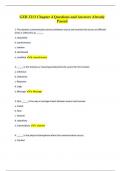
-
GEB 3213 Chapter 4 Questions and Answers Already Passed
- Exam (elaborations) • 8 pages • 2023
- Available in package deal
-
- $10.99
- + learn more
1. The dynamic communication process between source and receiver that occurs at different times is referred to as _____. a. sequential b. asynchronous c. random d. distributed e. stratified b. asynchronous 2. _____ is the stimulus or meaning produced by the source for the receiver. a. Inference b. Deduction c. Response d. Logic e. Message e. Message 3. A(n) _____ is the way a message travels between source and receiver. a. transit b. flow c. channel d. repository e. intermediar...
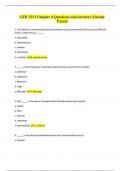
-
GEB 3213 Chapter 4 Questions and Answers Already Passed
- Exam (elaborations) • 8 pages • 2023
-
Available in package deal
-
- $9.49
- + learn more
GEB 3213 Chapter 4 Questions and Answers Already Passed 1. The dynamic communication process between source and receiver that occurs at different times is referred to as _____. a. sequential b. asynchronous c. random d. distributed e. stratified b. asynchronous 2. _____ is the stimulus or meaning produced by the source for the receiver. a. Inference b. Deduction c. Response d. Logic e. Message e. Message 3. A(n) _____ is the way a message travels between source and receiver....
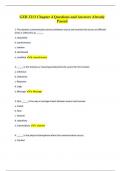
-
GEB 3213 Chapter 4 Questions and Answers Already Passed
- Exam (elaborations) • 8 pages • 2023
- Available in package deal
-
- $9.99
- + learn more
1. The dynamic communication process between source and receiver that occurs at different times is referred to as _____. a. sequential b. asynchronous c. random d. distributed e. stratified b. asynchronous 2. _____ is the stimulus or meaning produced by the source for the receiver. a. Inference b. Deduction c. Response d. Logic e. Message e. Message 3. A(n) _____ is the way a message travels between source and receiver. a. transit b. flow c. channel d. repository e. intermedia...
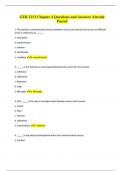
-
GEB 3213 Chapter 4 Questions and Answers Already Passed
- Exam (elaborations) • 8 pages • 2023
- Available in package deal
-
- $11.49
- + learn more
GEB 3213 Chapter 4 Questions and Answers Already Passed 1. The dynamic communication process between source and receiver that occurs at different times is referred to as _____. a. sequential b. asynchronous c. random d. distributed e. stratified b. asynchronous 2. _____ is the stimulus or meaning produced by the source for the receiver. a. Inference b. Deduction c. Response d. Logic e. Message e. Message 3. A(n) _____ is the way a message travels between source and receiver. a. t...
GEB 3213 Chapter 4 Questions and Answers Already Passed
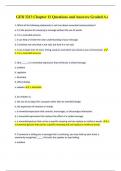
-
GEB 3213 Chapter 11 Questions and Answers Graded A+
- Exam (elaborations) • 14 pages • 2024
- Available in package deal
-
- $11.49
- + learn more
GEB 3213 Chapter 11 Questions and Answers Graded A+ 1. Which of the following statements is not true about nonverbal communication? a. It is the process of conveying a message without the use of words. b. It is a reversible process. c. It can help or hinder the clear understanding of your message. d. It involves not only what is not said, but how it is not said. e. It can include tone of voice, timing, posture, and where you stand as you communicate. b. It is a reversible process. 2. A(...
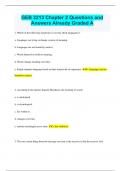
-
GEB 3213 Chapter 2 Questions and Answers Already Graded A
- Exam (elaborations) • 20 pages • 2023
-
Available in package deal
-
- $9.99
- + learn more
GEB 3213 Chapter 2 Questions and Answers Already Graded A 1. Which of the following statements is not true about language(s)? a. Languages are living exchange systems of meaning. b. Languages are not bound by context. c. Words themselves hold no meaning. d. Words change meaning over time. e. People interpret language based on their framework of experience. b. Languages are not bound by context. 2. According to the famous linguist Hayakawa, the meaning of words: a. is ontological. b. is e...

Did you know that on average a seller on Stuvia earns $82 per month selling study resources? Hmm, hint, hint. Discover all about earning on Stuvia

